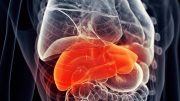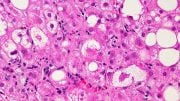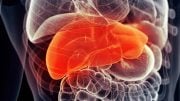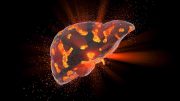
Researchers discovered a new method to protect the liver from fat buildup, offering potential treatments for alcoholic liver disease (ALD) and other fatty liver diseases.
A team of researchers at the Yale School of Public Health has identified a novel mechanism that protects the liver against the accumulation of fats and may represent a promising new therapeutic approach for treating and/or preventing alcoholic liver disease (ALD) and other fatty liver diseases.
Professor Vasilis Vasiliou, chair of the Department of Environmental Health Sciences, led the study in collaboration with colleagues from around the United States and Japan. The findings are published in the journal Scientific Reports.
Although the pathogenesis of ALD is poorly understood, it is believed that oxidative stress (caused by the overproduction of free radicals associated with decreased levels of the antioxidant glutathione) plays a critical role. The study showed that mice genetically engineered to have much lower levels of glutathione in the liver are more resistant to alcohol-induced accumulation of fatty cells in the liver (steatosis, a major symptom of ALD) despite having increased levels of oxidative stress in the liver.
“This is an amazing finding that reveals an unanticipated capacity of oxidative stress to elicit beneficial cellular responses,” said Vasiliou, who specializes in alcohol-related illnesses. “This should advance the field by providing a new direction for preventing and/or treating alcoholic liver disease and, potentially, other fatty liver diseases.”
The researchers showed the involvement of activation of the AMP-activated protein kinase (AMPK) pathway in the liver, which, in turn, promoted beneficial changes in fat and lipid mobilization. The next step is to develop a new class of drugs that mimic the effects of this process on AMPK. This possibility is particularly exciting because there is currently no effective therapeutic treatment for ALD.
“Developing such drugs may revolutionize the treatment of this disease,” Vasiliou said.
ALD accounts for over 30,000 deaths annually in the United States alone. The disease results in a variety of complications, including bleeding, coma, sepsis, cirrhosis, liver failure, and death. There are no effective therapies for any form of ALD, making this an area of great unmet need. With advanced disease simply stopping drinking does not result in reversal of ALD.
Vasiliou said that the study could not have been accomplished without the participation and resources of leading experts in the field. “These important findings are the result of collaboration and teamwork. It is not possible to do this kind of science alone,” he said. Contributors to the study included researchers from Yale School of Public Health (Ying Chen, research scientist, and Surendra Singh, postdoctoral fellow), the National Cancer Institute and the National Institutes of Alcohol Abuse and Alcoholism of the National Institutes of Health, the University of Colorado, and the Saga University School of Medicine in Japan.
Reference: “Chronic Glutathione Depletion Confers Protection against Alcohol-induced Steatosis: Implication for Redox Activation of AMP-activated Protein Kinase Pathway” by Ying Chen, Surendra Singh, Akiko Matsumoto, Soumen K. Manna, Mohamed A. Abdelmegeed, Srujana Golla, Robert C. Murphy, Hongbin Dong, Byoung-Joon Song, Frank J. Gonzalez, David C. Thompson and Vasilis Vasiliou, 12 July 2016, Scientific Reports.
DOI: 10.1038/srep29743









Be the first to comment on "New Yale Research Reveals Insights into Alcoholic Liver Disease"